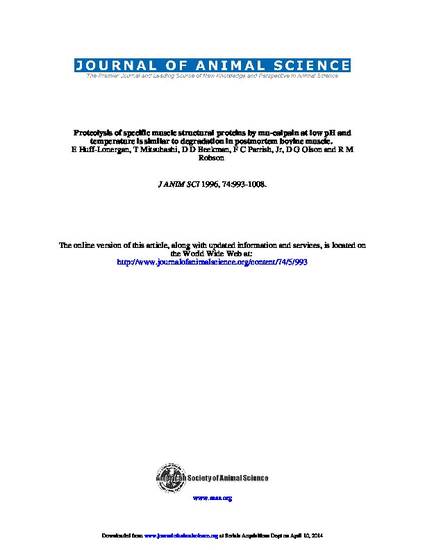
Postmortem (PM) and mu-calpain-induced degradation of specific skeletal muscle proteins was monitored by SDS-PAGE and Western blotting. Samples were removed from bovine longissimus thoracis (LT) at approximately 45 min PM for the preparation of at-death (0-d) myofibrils (MF). The LT was excised at 1 d PM, vacuum-packaged, and stored at 2 degrees C. Samples were removed for Warner-Bratzler shear force analysis and biochemical analysis at 1, 3, 7, 14, 28, and 56 d PM. The protease mu-calpain was purified from bovine skeletal muscle and used to digest at-death MF at pH 5.6, 4 degrees C, 100 microM CaCl2. Degradation of the proteins titin, nebulin, filamin, desmin, and troponin-T was monitored in the PM and mu-calpain-digested samples by using SDS-PAGE and Western blotting. The PM samples that had significantly lower shear force (LSF) values (P < .05) at 1 d PM exhibited faster degradation of these five proteins than the higher shear force (HSF) samples. In LSF samples, the intact titin band (T1) was absent by 7 d PM and nebulin was absent by 3 d PM. In LSF samples, some filamin was degraded by 3 d PM, but in HSF samples degradation was not apparent until 14 d PM. In LSF samples, desmin was degraded more rapidly PM than in HSF samples. Troponin-T was broken down PM to yield two major polypeptides of approximately 28 and 30 kDa; these polypeptides appeared earlier PM in LSF samples. Degradation products, similar to those observed PM, for all five proteins also were detected in Western blots of mu-calpain-digested MF, suggesting the calpain system plays a key role in PM protein degradation.
Available at: http://works.bepress.com/elisabeth_huff-lonergan/62/

This article is from Journal of Animal Science 74 (1996): 993–1008. Posted with permission.